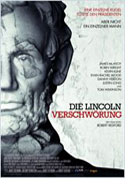

Opening 29 Sep 2011
Directed by:
Robert Redford
Writing credits:
James D. Solomon, Gregory Bernstein
Principal actors:
James McAvoy, Robin Wright, Kevin Kline, Tom Wilkinson, Evan Rachel Wood
Oftentimes, reality is more compelling than fiction as The American Film Company’s premiere film The Conspirator, with Oscar© winning director (Ordinary People) Robert Redford proves. On April 15, 1865, six days after Lee surrendered to Grant at Appomattox Court House ending the Civil War, the then-renowned actor John Wilkes Booth (sympathetic to the South) assassinated President Abraham Lincoln.
People knowledgeable of American history realize this, but lesser known (to many Americans as well) is that there was a three-prong conspiracy to also kill Vice-President Andrew Johnson and Secretary of State William H. Seward. Of the persons apprehended, seven men and one woman were taken before a military tribunal; Booth was killed being captured.
Widow Mary Surratt (Robin Wright) owns a boarding house where Booth and cohorts supposedly planned the simultaneous attacks, and her son John (Johnny Simmons), a friend to Booth, is missing. She contacts Senator Reverdy Johnson (Tom Wilkinson) to defend her, who secures Union war-hero and fledgling lawyer Frederick Aiken (James McAvoy) to be his second. Johnson, a southerner, senses prejudice at the tribunal, so forces Aiken to litigate the case, while proffering counsel. Secretary of War Edwin Stanton (Kevin Kline), frothing at the mouth for revenge he implies is for the grieving nation, wants perpetrators to hang, at whatever cost.
Wright’s restrained portrayal captures that time period: it is understated and precise – “I am a southerner, a Catholic, and a devoted mother.” McAvoy convincingly portrays someone caught in a quandary threatening his beliefs and all he cherishes and loves, especially when he begins to question Mary’s guilt. Wilkinson’s depiction of a highly-placed politician who, during a national crisis, takes a stance i.e., adheres to the law knowing he will be ostracized by many, with that of a person of honor, moral integrity, and individuality, is harmoniously balanced. Production values are high: Mark Isham’s original music is deliciously supportive as well as Newton Thomas Sigel’s cinematography. Editor Craig McKay’s opening sequence is confusing, considering how unknown this conspiracy is, however most assuredly producers, director et al had the final say.
For anyone interested in the United States’ history, this film is mesmeric. Purporting to historical accuracy and thick with subtleties both political and human, the minute gap between then, and now, is minute. The Conspirator will surely whet many viewers’ curiosity to want to read more about the people and the era surrounding this ominous affair. (Marinell Haegelin)